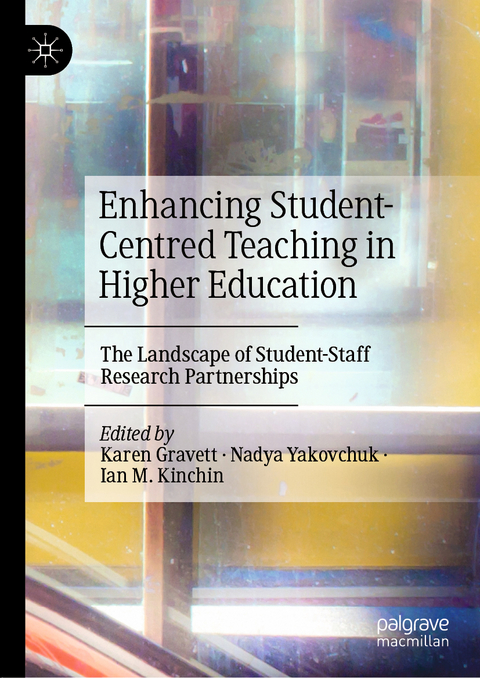
Enhancing Student-Centred Teaching in Higher Education
Springer International Publishing (Verlag)
978-3-030-35395-7 (ISBN)
Karen Gravett is Lecturer in the Department of Higher Education at the University of Surrey, UK. Her research focuses on student and academic identities, educational transitions, academic literacies and student-staff partnerships. Nadya Yakovchuk is a Teaching Fellow in the Doctoral College at the University of Surrey, UK. Her areas of interest include writing and knowledge construction in the disciplines, authorial voice and identity, academic integrity and student-staff partnerships. Ian M. Kinchin is Professor of Higher Education at the University of Surrey, UK. He is engaged in the professional development of academic staff, whilst undertaking research into university pedagogy.
Foreword; Alison Cook-Sather.- Chapter 1. Introduction: context and scope; Nadya Yakovchuk, Karen Gravett and Ian M. Kinchin.- Chapter 2. The emerging landscape of student-staff partnerships in higher education; Lucie Ollis and Karen Gravett.- SECTION I. Collaboration and creativity: exploring innovative partnership approaches.- Chapter 3. Student experience: perspectives on learning in the university and the conservatoire; Seán Hanratty and Anna McNamara.- Chapter 4. Exploring the actor-director relationship in the drama school through a student-tutor dialogue; Darrell Barnard-Jones and Trevor Rawlins.- Chapter 5. Escaping the norm of student-staff partnerships; Julia Anthoney, Julie Low, Samantha Gridley and Chidera Ude.- Chapter 6. Building knowledge and learning communities using LEGO® in nursing; Rachel Stead, Ralitsa Dimitrova, Avgi Pourgoura, Sarah Roberts and Sarah West.- Chapter 7. 3D printers in engineering education; Atefeh Eslahi, Deoraj R. Chadeesingh, Charlotte Foreman and Esat Alpay.- SECTION II. Evaluating teaching and learning approaches.- Chapter 8. Captured content and lecture recordings: perceptions and experiences of students and lecturers; Venetia Evergeti and Harry Garside.- Chapter 9. Captured content, captured attention?; Teodora-Patricia Pelea and Tom Lunt.- Chapter 10. A comparison of student perceptions of physical and virtual engineering laboratory classes; Charlotte Foreman, Mary Hilditch, Nicole Rockliff and Holly Clarke.- Chapter 11. Skills developed by economics students during their professional training year; Miguel Flores and Bardees Elmenofy.- Chapter 12. Exploring the benefits of project-based pilot plant experience for chemical engineering undergraduates; Benjamin Cooper, Rex Thorpe and Esat Alpay.- Chapter 13. Student perspectives on a nutrition curriculum; Katrina Kwong and Adam Collins.- Chapter 14. Learner engagement on a blended ethics education programme: perspectives of students and teachers; Barry Costello, Julia Brennan, Colin Loughlin and Ann Gallagher.- SECTION III. Partnership approaches to assessment, feedback and student-staff dialogue.- Chapter 15. Student nurses' experiences of receiving verbal feedback within the clinical learning environment: to what extent does this promote sustainable feedback practices?; Julie Panzieri and Cathrine Derham.- Chapter 16. Facilitating students' proactive recipience of feedback with feedback portfolios; Kieran Balloo and Aka Vashakidze.- Chapter 17. An innovative presentation tool as an alternative to traditional methods for student assessments; Andrew Hulton and Kyle Gapper.- Chapter 18. Maximising student participation: factors that facilitate dialogue; Katerina Ridge and Saima Islania.- Chapter 19. Using mindfulness meditation techniques to support peer-to-peer dialogue in seminars; Allan Kilner-Johnson and Edidiong Udofia.- SECTION IV. Staff-student partnerships: reflections and considerations.- Chapter 20. Creating space for new expertise: considerations for setting up student-staff partnerships; Irina O. Niculescu, Simran Nagpal and Roger Rees.- Chapter 21. Student-staff partnerships in higher education as process and approach; Ameena Khan Sullivan and Marion Heron.- Chapter 22. Conclusions: the future of student-staff partnerships; Ian M. Kinchin, Karen Gravett and Nadya Yakovchuk.
| Erscheinungsdatum | 25.01.2020 |
|---|---|
| Zusatzinfo | XXXIII, 380 p. 16 illus., 6 illus. in color. |
| Verlagsort | Cham |
| Sprache | englisch |
| Maße | 148 x 210 mm |
| Gewicht | 667 g |
| Themenwelt | Geisteswissenschaften ► Psychologie ► Pädagogische Psychologie |
| Sozialwissenschaften ► Pädagogik ► Erwachsenenbildung | |
| Schlagworte | Co-creation in higher education • Learning and Instruction • Student-centred Teaching • Student Engagement • Student-staff dialogue • Student-Staff partnerships |
| ISBN-10 | 3-030-35395-8 / 3030353958 |
| ISBN-13 | 978-3-030-35395-7 / 9783030353957 |
| Zustand | Neuware |
| Haben Sie eine Frage zum Produkt? |
aus dem Bereich


